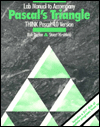

 |

|

The average rating for Pascal's triangle based on 2 reviews is 3 stars.
Review # 1 was written on 2012-03-07 00:00:00 Bjarne Christensen Bjarne ChristensenA set of simple but very evocative stories of New Zealand life. |
Review # 2 was written on 2016-08-28 00:00:00 Andrew Pidcock Andrew Pidcock4.5/5 I've run into my fair share of those who profess an interest, bordering on a devotion to in some, experimental writing. It's hard to take any of them seriously when I'm the only one of my Goodreads circle to have added, read, and reviewed, in that order, this work. In the interest of thoroughness, the reviewers that usually head the lists of the standard definition of experimental (a paradox if there ever was one, but that hasn't stopped the worshipers of the demographically conforming), so unless some are buried in the bowels of a rather small number of overtly interested readers, the only conclusion to be made is that, somehow, this book by a Man Booker winner has passed everyone by. Same shit, different day, but Rome wasn't built in a single iteration of such. Good luck trying to pin down what any of these are about, exactly. Here, you have poetry, a screen play, practically ubiquitous stream of consciousness, fantasy, sci fi (you could displace those last two into magical realism, but I prefer to think about them as a decentering of the Euro consciousness), bildungsroman, horror, mystery, horror mystery in the line of Hitchcock, all of it whirled together in some of the most carbuncularly dense yet deftly incisive prose I've read in a long time. The stories are more ghastly than anything else, what with their reoccuring themes of violence, disability, abject poverty, disintegration of the psyche once cut off from the natural world, the disintegration of the body when subjected to the natural world, animals being led to the slaughter, domestic abuse, suppression of the people's right to protest, settler state abuse, and any manner of way in which human beings are isolated via amputation. There's very little closure, even less social connection, and any motivation for plot usually births entirely from the single (?) first person narrator's slow devolution into rambling obsession and/or speedy succumbing to an overwhelming wave of something outside themselves: rarely human, never nice. Those who've read The Bone People may be pleased to know that these pages contain a portion of the past of the character of the mysterious child. Others who have not yet but plan on reading the Booker win may think they should consequently avoid this in case of spoilers, but Hulme is not a writer I'll consider to concentrate most, if any of her authorial worth in the form of a few somewhat convoluted plot points. Yet a third group who has had no contact whatsoever with the much more decorated novel will be free to decide without bibliographical bias whether this admittedly monstrous yet equally powerful collection is worth chasing down. As I said before, abandon hope of narrowing anything down. A better grasp than mine on New Zealand and Māori in yet another iteration of the colonialist tradition would most assuredly help, especially with regards to the indigenous vocabulary that mixes into view as much as it did in TBP. Still, that doesn't solve the ever present confusion of what time, place, gender, age, and even species the first person narrator is operating from. You may make your assumptions, but beware: any determination necessarily limits your experience of the experimental, and we wouldn't want that, now would we. For those obsessed with finding books to fulfill eclectic requirements for various reading challenges, Keri Hulme is Māori, asexual, and aromantic. I could pretend use one or all of these characteristics in tandem as paradigms for analysis, but eh. I'm more concerned with those out there who have a hard time seeing themselves in writing and even more so in literature. This is timely because Hulme, much like Roy, has been promising second/third (twinned works, apparently) novels for some time now. The fact that the latter has recently committed for a publication next year gives hope for the sooner rather than later output of this other unorthodox Man Booker winner. |
CAN'T FIND WHAT YOU'RE LOOKING FOR? CLICK HERE!!!